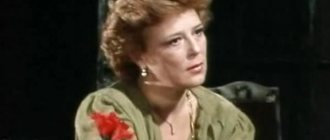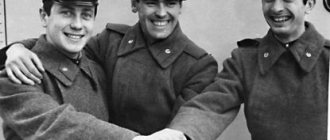Once upon a time, two rich families formed a small society and bought a Stradivarius violin for themselves. But they gave it for lifelong use to a legendary man, our contemporary, who turned out to be Vladimir Spivakov.
It was a smart decision. According to the musician, if earlier he taught an ordinary violin to play, now the Stradivarius violin teaches him to play.
Childhood
Vladimir Spivakov was born in 1944 in the city of Chernikovsk (as Ufa was previously called), in Bashkiria. The violinist’s mother, Ekaterina Osipovna Weintraub, came to her husband Theodor Vladimirovich Spivakov, who was an engineer by profession, who was wounded at the front and working in the rear. Volodya was born there.
After the war, the family moved to their homeland in Leningrad, where they huddled in a seven-meter room in a communal apartment. Little Volodya remembers how they often moved from one room to another, gradually expanding their living space. They also lived near St. Nicholas Cathedral. Vladimir Spivakov remembered for the rest of his life how he and his neighbor Anna Efimovna went to church. His baptism, carried out in secret, was etched in the boy’s memory. But he never regretted it, even though he was from a Jewish family.
Vladimir owes his musical talent to his mother, who had perfect pitch. Ekaterina Osipovna sat nine-month-old Volodya on the piano and played musical sketches. The child moved to the beat. If the music was happy, he jumped, and if the music was sad, he swayed.
Biography
Vladimir Spivakov graduated from the Moscow Conservatory in 1967. By this time, he already had a number of awards received at international competitions.
In 1975, the maestro held several solo concerts in the USA, which were a great success. Subsequently, Vladimir Teodorovich performed many times with the best orchestras in the world. Leading world critics note that V. Spivakov's performing style is intelligent, artistic, bright, emotional, and the sound is rich and voluminous. The musician himself always says that he owes his mastery to teachers Yu. Yankelevich and D. Oistrakh. In 1979, Vladimir Teodorovich created a chamber string orchestra called “Moscow Virtuosi”, where he is a soloist, chief conductor and artistic director. Before organizing the team, V. Spivakov carried out lengthy preparatory work. He studied the art of conducting with L. Maazel, I. Guzman and even with L. Bernstein. The latter presented Vladimir Teodorovich with his own baton, which Spivakov has not parted with to this day.
Vladimir Spivakov, creative biography
From the age of six, Volodya began to learn to play the violin from such a master as B. E. Kruger, who at first did not find his talent. According to the musician’s recollections, the teacher squeezed all the juice out of him, and the boy did not want to play. But one day, having heard Pyotr Ilyich Tchaikovsky’s “Reflections” performed by a high school student, Volodya was so shocked that, when he came home and took the violin, he performed a piece of music with one finger and one string. This music penetrated his heart, and now, as then, Tchaikovsky is the maestro’s favorite composer.
After hearing the boy play "Reflection", Kruger decided that something could come of him. In 1955, Vladimir Spivakov entered the secondary special music school at the Leningrad Conservatory.
Brief biography of Vladimir Spivakov
In 1944, a future talented Jewish musician was born in Bashkiria. Ekaterina Osipovna Weintraub gave birth to Vladimir to Theodora Vladimirovich Spivakov in Chernikovsk (present-day Ufa). Those were the fierce war years and harsh life in the rear, where the husband, who had been discharged from the front due to injury, worked as an engineer. At the end of the war, the family moved to their native Leningrad.
Despite his Jewish roots, Vladimir was baptized as a child and went to almost all services in Orthodox churches. From that time, he remembers well how their family constantly moved due to the continuous process of improving living conditions. The moment came when two rich families got together and bought a Stradivarius violin, which they gave to the brilliant musician for lifelong use. From then on, Spivakov began to claim that it was not he who taught the violin how to sound, but it was the violin that taught him.
From the age of six, the boy took violin lessons from the famous master B. E. Kruger. An interesting fact from the life of the maestro was when he first heard P. I. Tchaikovsky’s musical work “Reflection” performed by one of the high school students. Arriving home, Vladimir rehearsed him so much that the teacher, who had previously rejected any talent in the boy, was forced to radically change his opinion on this issue.
In 1955, Vladimir Spivakov entered the music school at the Leningrad Conservatory. Around the same time, a gifted young man began to actively develop his talent as an artist, enrolling as a volunteer in the painting school at the Leningrad Academy of Arts. But when the question of choosing a profession became acute, he was still forced to give preference to music.
At the age of thirty-five, an already accomplished musician begins to study the conducting profession, taking lessons for five years from I. B. Gusman in Moscow and Nizhny Novgorod. And then the country learns about the chamber orchestra “Moscow Virtuosi”, which after some time disintegrates and is recreated in a new form as “Virtuosi”. Now Vladimir Teodorovich is becoming a real master and a well-known personality throughout the musical world.
Painting in the life of a musician
But Volodya also discovered a talent for fine arts. All these years he attended the painting school at the Leningrad Academy of Arts as a volunteer. There was even a time when Spivakov seriously wanted to become an artist, but the time came when he was faced with a choice: either music or painting.
Vladimir Teodorovich, sharing his knowledge, said that painting greatly helped him in playing the violin, since artists have a heightened sense of color, perspective and composition, which can be applied in music.
Violin
Vladimir Spivakov, for whom music has always been the most important thing in life, began his creative journey at the age of 7. At first he learned to play the cello. But the future famous musician was very thin and small, so he asked to replace his instrument with something lighter. After which he was assigned to the violin. At first the boy studied at a regular music school, and in 1961 he transferred to a ten-year school at the conservatory. His teacher considered Vladimir talented and said that in his hands any saucepan would sound.
Until 1997, Vladimir Teodorovich played the violin created by the master Francesco Gobetti. It was given to him by his teacher, Professor Yankelevich. And in 1997, his dream came true - he got an Antonio Stradivarius violin, which he received as a gift from fans and patrons.
How to protect a violin
As a teenager, Spivakov had to defend his violin from his ruthless peers. It was then that Volodya Spivakov, a boy from a good family, decided to enroll in the boxing section. These skills were useful to him in the future.
In 1977, at the famous concert hall Carnegie Hall, Vladimir Spivakov was attacked right on stage. During the concert, a young man from the tenth row runs onto the stage and throws a three-kilogram plastic jar directly into Spivakov’s solar plexus. At the first moment, the musician thought that they wanted to kill him. He was bent in half, but he continued to play with all his strength. Then, having a trained eye as an artist, Vladimir noticed a drop of red paint on the violin. Everything became clearer in his mind, he realized that they did not intend to kill him, and gave himself an internal order to finish the game to the end. Gradually leveling his breathing and straightening up, Vladimir Spivakov played the concert to the end, fully erect. The last note D sounded fortissimo.
Seeing such courage of the musician, the whole audience stood up and shouted “bravo.” The famous writer Sergei Dovlatov wrote about this incident in his ironic story “Solo on Underwood.”
When Spivakov told his childhood friend and writer Solomon Volkov about this incident, he, in turn, expressed a desire that his friend be given the title of Honored Artist for his courage. To which Spivakov said that it would be better if he were given the title of Honored Master of Sports.
Vladimir Spivakov: personal life
The musician's first wife was the famous pianist Victoria Postnikova. They got married very young, out of great love, and soon a son was born, Alexander, who later followed in his father’s footsteps and became a violinist.
Victoria was a talented pianist and, like her husband, received awards at competitions. In 1970, in the most difficult music competition named after Tchaikovsky, Vladimir Spivakov became the laureate of the competition and received a silver medal and second prize. Victoria also receives a prize at this competition. Despite the musical successes of the spouses and the sacrificial love of her husband, Victoria decides to leave him for the composer Gennady Rozhdestvensky.
Spivakov bravely endures this blow and betrayal. He personally sees his wife off and puts him in a taxi. After this, his decision to devote himself entirely to music is strengthened.
Sati Spivakova
Only many years later, while touring with the Moscow Virtuosi orchestra in Yerevan, Spivakov comes to visit the famous Armenian violinist Zare Sahakyants. Seeing photographs of a young beautiful girl on the wall, he immediately thought that she would become his wife. Subsequently, this is what happened. Sati Sahakyants was studying in Moscow at GITIS at that time. Having invited her to his concert, Spivakov could no longer help but think about her. Arriving home after another tour, he called Sati at twelve at night and apologized for calling so late, to which she replied that she was waiting for him.
They had two girls: Tatyana and Anna. The eldest Tatyana now serves in the theater, following in her mother’s footsteps, and the youngest Anna devoted herself to music and became a singer. In addition to them, the Spivakovs adopted the daughter of Vladimir Teodorovich’s sister, who passed away early.
Personal life of Vladimir Spivakov
Even now, when the musician is over 70 years old, women do not remain indifferent to Spivakov’s charm and energy; he was married three times. The first wife, Victoria, was a wonderful pianist. Their union was based on passionate love. The couple had a son, who also became a musician. But the young family could not cope with everyday life.
After breaking up with Victoria, Vladimir had a civil marriage with Svetlana Bezrodnaya, who took part in the creation of the orchestra. But the relationship did not work out, although it lasted 7 years.
Vladimir’s second official wife was Sati Sahakyants, who graduated from GITIS. He has been happy with her for about 30 years. They have three daughters, and the couple also adopted Vladimir’s niece, the daughter of his deceased sister.
The nineties
At the beginning of perestroika and then during the difficult years, when such an empire as the Soviet Union collapsed, Vladimir Teodorovich realized that children and the elderly would have a hard time living at this time, and decided, together with his friends, to organize the Vladimir Spivakov Foundation, financially and morally extending a helping hand to everyone those in need.
When a musician and conductor tours with young musicians in Russian cities, he sets a condition that cannot fail to be fulfilled. Children from local music schools and their teachers should sit directly on stage as guests.
Such famous pianists as Denis Matsuev and Zhenya Kissin began their careers with Vladimir Spivakov.
Conductor
At the age of 35, the musician begins to think about the conducting profession, which fascinates him more and more. Vladimir Teodorovich believes that there should be a conductor in every musician. It is difficult to become a real conductor; it requires special training. Therefore, Spivakov takes lessons from I.B. Gusman, and for five years he studies with him in Nizhny Novgorod and Moscow.
Vladimir Spivakov received advice from such masters of conducting as Bernstein and Maazel. And Vladimir Teodorovich keeps Leonardo Bernstein’s baton as a relic.
Vladimir Spivakov’s chamber orchestra “Moscow Virtuosi” is gradually being organized, consisting of brilliant musicians, close friends of the master. All people who are more or less interested in classical music have heard about their successful concerts. Then, unfortunately, the orchestra disbanded, but now the Virtuosi are performing again with a new lineup.
Today, Spivakov, in addition to the foundation and chamber orchestra, directs the Russian National Orchestra, the repertoire of which mostly consists of musical works by Russian composers.
Spivakov is a man of great soul, and understands what culture, art and raising children are. Therefore, it is completely understandable why he created a foundation that connects children and artists from different countries. Such a definition as a bridge man suits him quite well.











